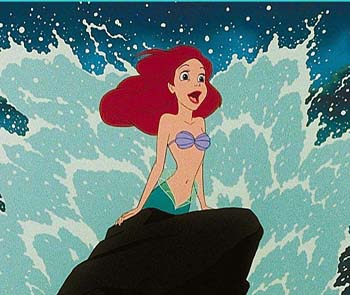

| "The Little Mermaid, released by Disney in 1989, is another adaptation of a fairy tale in which social formations can be interpreted through psychoanalysis. The movie is about King Triton's youngest teenage daughter, Ariel, who is curious about life on land and collects man made objects that end up in the ocean. After rescuing Prince Eric when he falls into the sea during a powerful storm, she decides she must be human so that she can be with him. Against her father's instructions that forbid her fascination with the human world, especially any contact with it, Ariel sees Ursula, the sea witch, and exchanges her voice for legs. The notion of beauty surfaces once more as an obvious means to an end. Unlike Cinderella, Ariel is already a princess, but her interest in the human world leaves her unsatisfied with her life under sea and leads her to pursue her love for Prince Eric. It is this very behavior that distinguishes her from other Disney princesses, but makes her like them as well. |
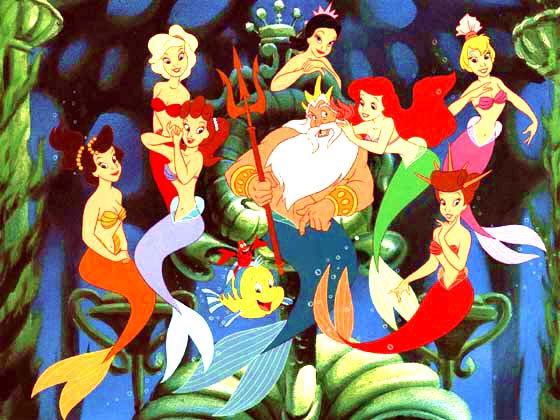
|
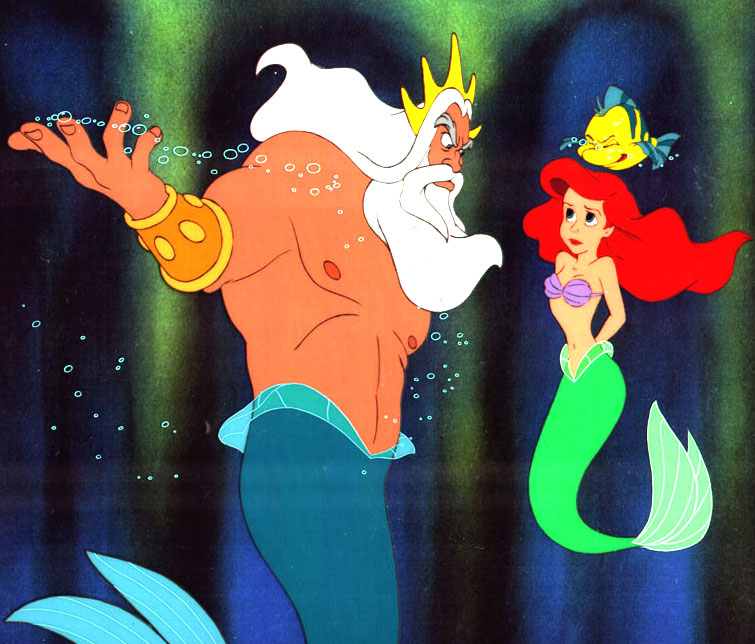 |
The movie begins with Ariel's sisters singing to introduce her and they describe her voice as being "like a bell." Early on, we are informed of Ariel's talent as a singer so it is surprising to see this teenage girl give up her voice in order to have legs. Giving up her voice not only means she can no longer sing, but more importantly, that she can no longer speak. Literally, the female heroine is stripped of her voice. At the beginning, Disney's Ariel appears to be fun, inquisitive and adventurous, diverging from the typical behavior of a princess in a fairy tale, but soon enough the heroine is silenced when she chooses to lose the things that defined her for a man she does not even know. She sacrifices her voice, her family and sea friends for a life on land, and above all for Prince Eric. Laura Sells compares Ariel's conformity to that of a woman's saying, "Like so many other women who enter 'the workforce' or any other 'male sphere,' Ariel wrestles with the double-binding cultural expectations of choosing between either voice or access, but never both" (179). The dilemma Ariel faces is that there is no in-between room for her to have a life under the sea and on land as well and by entering the human world she chooses to let go of everything she knows. |
| At the beginning of the movie we are led to believe that Ariel's motives for life on land are her deep interests in the human world and how humans live and act. Ariel affirms this when she is in her secret cave looking at her collection of human objects . During this scene she sings Part of Your World and reveals her feelings for the place she lives in and where she wishes she could be. She makes distinctions between the sea and the land, and sings about how she's "got gadgets and gizmos aplenty, whozits and whatzits galore," but either way, the things she has accumulated don't amount to her longing to be part of the world above where she believes women possess a distinct voice. She sings, "Betcha on land they understand. Bet they don't reprimand their daughters. Bright young women. Sick o' swimmin'. Ready to stand." Yet, her later actions do not correlate with this desire to live on land where she feels she can obtain her independence. Once Prince Eric is introduced into Ariel's life, all of her ideals seem to disappear and it is clear that the male character has overpowered her desires for anything else. As a female character, Ariel is given the opportunity to be different from the other princesses we know, but in the same way voyeurism is a tool for controlling women in film, Ariel too becomes a subjective figure through this view. At first Ariel is "threatening but ultimately guilty and weak" once Prince Eric becomes her principal focus (Rose 117). Through voyeurism, Ariel's character becomes much more delicate and this is done "by investigating the woman and then punishing or saving her," which is exactly what Prince Eric does for her when he saves Ariel by killing Ursula and then marrying her (117). |
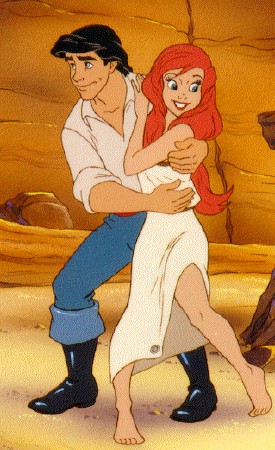

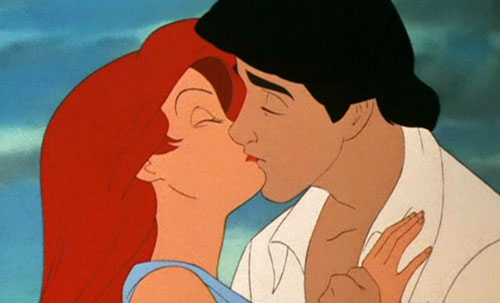
|
| Through a voyeuristic point of view, the distance between the male and female which keeps the female at a distance, always objectifying her, is portrayed through Ariel's inability to communicate with Eric. She fascinates him even if, in many instances, he obviously does not understand her. Through the transformation Ursula is able to grant, Ariel becomes like other Disney princesses, in which being a passive and beautiful female is the proper way to be. When Ariel tells Ursula that without her voice she will not be able to communicate with Eric, Ursula says, "You'll have your looks! Your pretty face! And don't underestimate the importance of body language! Ha!" Ursula's response emphasizes the suggestion that a woman's voice, her ability to express and share her own opinions and decisions, hardly matters since men care most about how attractive and sexy a woman is. The power beauty has in this and other Disney princess movies problematizes the type of acculturation young girls face. Since a very young age these girls have access to negative portrayals of females, many of them presented as though they are simply female nature, underestimating the media's power and influence. Through psychoanalysis, "centrally concerned with the process through which sexual difference is established and (often precariously) maintained," Ariel's actions can be regarded as an affirmation of female subjectivity (Rose 113). Her transformation for Prince Eric is depicted unrealistically as something painless and simple, whereas Hans Christian Anderson's tale describes an excruciating process. In this example of female subjectivity Ariel's legs show "compliance with the beauty culture, rather than her desire for access, mobility, and independence" (Sells 180). |